#Disaster Prep
Explore tagged Tumblr posts
Text
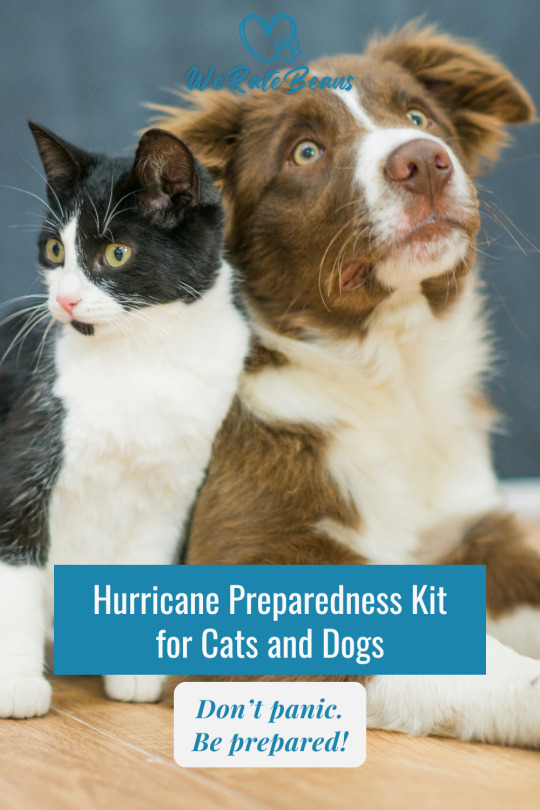
Living along the Gulf Coast, my kids and I know firsthand how unpredictable and dangerous hurricane season can be. With forecasts predicting an especially active season this year, being prepared is more important than ever.
While many families take steps to protect themselves, pets are often left behind during emergencies, forced to endure the terror of massive storms because their owners weren’t prepared to evacuate with them or because local resources couldn’t accommodate them.
Preparing in advance is crucial for keeping your family—including your pets—together and reducing the risk of abandoning them during an emergency.
Here is our simple guide to creating a Hurricane Preparedness Kit for your cats and dogs and tips on training your pets to be ready to go immediately.
This post contains affiliate links, and we only recommend products we have either used, are using, or would use and share with our family and friends. Click here to read our Affiliate Disclaimer.
Hurricane Preparedness Kit for Cats and Dogs
A well-stocked Hurricane Preparedness Kit is essential for ensuring the safety and comfort of your pets during a storm. Here’s what to include:
Emergency Contact Information
ID Tags Ensure collars have up-to-date ID tags with contact details and any medical information.
Emergency Contact List Keep phone numbers for your vet, local animal shelters, and emergency contacts.
Basic Supplies
Food & Water Pack 3-7 days' worth of food and bottled water for each pet. A portable water filter is also helpful for extended emergencies.
Portable Bowls Collapsible or travel bowls for easy feeding and watering.
Can Opener Include a manual can opener for canned food.
Medications & Health Supplies
Medication Please ensure you have a minimum 7-14 day supply of prescribed medications.
First Aid Kit Your pet first aid kit should include antiseptic wipes, gauze, bandages, tweezers, and a thermometer suitable for cats and dogs.
Flea & Tick Prevention Have prevention supplies on hand. (We carry flea-killing medication and dewormer as well.)
Comfort Items
Favorite Toys or Treats Familiar items provide comfort during stressful situations. Invest in a second version of your dog's favorite squeaky duck or tennis ball (with single toss manual or automatic launcher). Don't forget the catnip and catnip toys for cats!
Blanket or Bed A portable, waterproof blanket or foldable pet bed.
Safety Gear
Leash & Harness Pack a sturdy leash and harness for your dogs and cats and ensure they’re accustomed to them.
Collar Ensure collars are well-fitted with ID tags. Consider a GPS tracking device to help keep track of your pet, just in case.
Cleaning Supplies
Litter & Litter Box Pack enough litter for at least a week and a portable or collapsible litter box for cats.
Waste Bags For cleaning up after dogs.
Puppy Pads Useful for indoor bathroom needs.
Travel Gear
Carrier or Crate A sturdy, well-ventilated carrier or crate for safe transport.
Seat Cover Keep your vehicle clean with a seat cover during travel.
Seatbelt Clip Ensure your pet's safety even if you opt not to use a carrier, crate, or backpack. Humans wear seat belts for our protection in case of an accident, your pet should too.
Dog Runner/Tie Out System Let your dogs or cats stretch their legs and get some energy out in a safe, controlled way. We use carabiners or bull snaps to change the length of the line and there are tree protectors.
Medical Records
Vaccination Records Keep copies of vaccination records and other necessary medical documents for each pet. Even if your vet is part of a more extensive network like Banfield or is great about sharing their records when needed, having copies on hand can save time during a medical emergency. They can also help when local authorities or pet-friendly accommodations need access to specific health and vaccination information.
Vet’s Contact Information Have your vet’s contact info readily accessible.
Identification
Microchip Info Ensure your pets are microchipped and the registration is up-to-date.
Recent Photo A current photo of each pet in case you need to post lost pet notices.
Backup Power
Portable Charger Keep a charger handy for essential electronics like phones or GPS trackers.
Hydration & Food Accessories
Portable Water Filter Useful for extended emergencies.
Freeze-Dried Food Lightweight, long-lasting food option.
Additional Items
Carrier Cover Helps to calm pets during transport. You can buy a custom cover or use a towel. [Please ensure your pet can still breathe fresh air.]
Calming Products Pheromone diffusers and calming treats to reduce stress are available for dogs and cats. Our multi-cat household has had great success with Feliway diffuser plugins.
Pet Raincoat Keep dogs dry during heavy rain. Smaller dog raincoats can be used for cats.
Cooling Bandana, Vest, and/or Mat Helps manage body heat in hot, humid conditions. In a pinch, you can use ice packs stuffed into spare pillowcases.
Rechargeable USB Fan To ensure your pet gets access to continuous air flow, consider investing in a rechargeable USB fan. We prefer the clip-on kind like our mini Gaiatop because they fit almost anywhere and are easily charged with a standard USB C but they come in larger sizes and with different bases. The 8" Koonie is used by several vanlife YouTubers. You can also choose a fan that uses a battery pack that is interchangeable with your cordless tools and lawn gear.
Packaging Tips
Waterproof Bag or Container Store all items in a waterproof bag or container (dry bag) and place it inside or on top of one of the carriers. In an emergency, this will make everything grab and go. For pets with special needs, consider using a carabiner to attach a smaller dry bag with pet-specific items to their carrier or backpack. This also works well for multi-pet households if more than one family member will be helping with pet evacuation as each dry bag can contain all the pet related items for the pets each family member will be responsible for.
Easy Access Keep the kit in a readily accessible place for quick grab-and-go and make sure every family member knows where these items are, how to access them, and how to use them.
Training Your Pets for Emergency Situations
Being prepared isn’t just about having the right supplies—it’s also about training your pets to stay calm and respond to commands during an emergency. This is true for both dogs and cats.
Here’s how:
Practice Evacuation Drills Regularly practice quickly getting your pets into their carriers or crates. Reward them with treats and praise to create positive associations.
Go Bag Familiarity You can get your pets used to their emergency kits by slowly introducing them to the items. Let them sniff and explore the carriers, leashes, and other gear.
Command Training Teach basic commands like “come,” “stay,” and “shh” to help maintain control in a chaotic situation. Practice these commands calmly so your pets are more likely to respond during an emergency.
Stay Calm Pets often mirror our emotions. Take a few deep breaths, remember you've been preparing, and consider your circumstances. What do you know? What do you have? What can you do? If you can stay calm during an evacuation, your pets are likelier to remain calm, too. Your confidence will help them feel safer and encourage them to self-regulate, just like you did.
No family member left behind.
Preparing for hurricane season is about more than just securing your home—it’s about ensuring the safety and comfort of every family member, including your pets.
By creating a Hurricane Preparedness Kit and training your pets for emergencies, you can keep your family together and reduce the stress and chaos of a storm.
Stay safe, be prepared, and protect the ones you love.
2 notes
·
View notes
Video
Important
#Disaster Prep#Disaster Preparedness#useful#interesting stuff#informative#information#info#interesting#interesting facts#cool facts#fun facts#facts#random facts#fact#resources#cool
111K notes
·
View notes
Photo
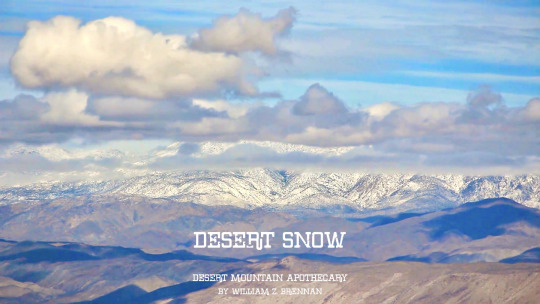
The largest winter storm that’s hit the desert in years, including the first blizzard warning for San Diego county in history bore down on the San Diego Backcountry this week. A ferocious mix of driving wind, torrential rain and blinding snow tested our resilience, and preparation separated those experiencing quirky backcountry inconvenience, from those facing hardship. Yes, preparation, the one attribute that can’t be mustered up in the face of adversity, only planned and executed in advance, is what will give us a fighting chance of getting through.
https://www.youtube.com/watch?v=qoZrv58Dk08
#desert#desert snow#desert winter#desert blizzard#desert mountains#time lapse#time lapse videos#timelapse#landscape videos#nature#preparation#emergency preparation#emergency preparedness#disaster prep#disaster preparation
0 notes
Text
Emergency Preparedness On A Budget
Hey all, just a reminder that even though many of us are looking at a warmer-than-average winter this year, warm on average does not mean we won't see winter storms! In fact, warm winters can produce some really unusual weather patterns that are even more likely to produce severe storms. The best time to prepare for a winter storm, or any other natural disaster, is well before it happens, ie, right now.
"But wait," you might say, "the economy is stupid and everything is expensive! I'm afraid my survival bunker is just going to have to wait until my lottery numbers come up, which will take awhile because I also can't afford to play the lottery." First off, good job not playing the lottery, and second, preparing for a disaster does not have to be expensive. In fact, if you start early enough, disaster preparedness can be done a few dollars at a time without much of anything in the way of special supplies.
In order to not make a single post that is a billion lines long, I am dividing my advice into a few different posts and will link them together when I am done. The links will be right here:
Food and Water Preparedness
FIrst and most important: food and water. The motto of disaster preparedness is "The first 72 is on you." In a major disaster situation, if the situation has not resolved itself within three days, that's about the amount of time it takes for outside help to get itself organized and start arriving in a meaningful way to a disaster area. Objectively three days is a pretty short period of time, subjectively it is a small eternity if you are not prepared.
Preppers (people who do disaster preparedness as a hobby, to greater and lesser levels of unhingedness) spend a lot of time discussing the best types of food and water prep for long-term storage and/or end of the world scenarios. We are not going to do that. We want cheap, easy, effective preparations that we can ideally do while grocery shopping in a Walmart. The easiest, simplest and cheapest way to do your food prep is this: Buy one or two canned, jarred or tetrapacked (that waxed cardboard box pack) meal items every time you can afford it, then set them aside. Find a little space in a closet, a cupboard, a shelf, whatever, and just keep those foods there until you have three days worth for everyone in your household, including the pets.
"Fine," you might say as you look skeptically at the back of your cupboards, "but that doesn't seem very specific. There are a lot of canned goods out there!" And that is fair! The basic rule of thumb is "Buy something you will eat, ideally without heating it up if necessary, that doesn't require much prep or cleaning." For example, my family is two adults and one adolescent, none of us with major food allergens or aversions. If I were trying for a 72-hour food prep for us on the cheap with no cooking available I'd probably go with six cans of chunky soup, which I get for a dollar each on sale, three small jars of applesauce (smaller jars are better if you have no way to cool food), a box of saltine crackers, three cans of tuna, and a big box of granola bars if I could keep them out of reach of the kiddo long enough.
It's not fancy and it may not provide great long-term nutrition, but it's enough food to keep us alive for three days in a form that will hold in storage for 1-2 years without needing to rotate. Even on a very tight budget you can probably accumulate this much food in a pretty reasonable amount of time (and a lot of it is the sort of thing you might get from a food bank anyway!) For pet food, pack up three days worth of your pet's food, ideally in a glass jar but any sealed container will do, and add any cans of wet food they'd get as well.
Water is another big prepping topic that we're going to go easy-peasy on. You need, at minimum, a gallon of clean water per person per day, plus extra for cleaning and washing. Water is annoying to store and takes a lot of room, so for a quickie 3-day prep, minimizing water use is ideal. If you can scare up enough paper plates, cups and utensils to last you three days, you save ever having to wash dishes. If you can get hold of a pack of wet wipes, you reduce the amount of water for washing your body. If you can bring yourself to pee in the woods or at the very least let urine sit in the toilet unflushed, you save a HUGE amount of water on flushing.
For your water prep, you can use the bit-at-a-time strategy again. Every time you get groceries, try to bring home a gallon or two of purified drinking water. They should be very cheap, usually around 1.25 in my neck of the woods, and they last for awhile. If you have a few extra dollars, buy a flat of bottled water until you have at least three gallon containers and one 12-pack for each human member of your household Tuck them away somewhere out of direct sunlight, and rotate them regularly, taking out an old gallon and flat and replacing them with new every couple of months.
Once you have your basic setup, you can start thinking about getting fancier. There are ways to find things like camp stoves and water filters fairly cheaply, usually by hitting up garage sales or looking in the clearance sporting goods section when camping season is over, but that's basically gravy when compared to just having something to eat.
Next Time: Light, Heat and Medicine
#disaster preparation#preparedness#prepping#budget shopping#the first 72 is on you#winter storm#hurricane
75 notes
·
View notes
Photo
Yearly reminder that this is true, but you still need to clear the leaves directly around your home. Having leaves all over your yard is a fire risk. And I'm not just talking about a wildfire here, I'm talking about any fire. Maybe your neighbor's house catches on fire. Maybe a car driving by causes a spark somehow. Maybe someone's yard decoration focuses light in a dangerous way. If you have piles of leaves right up against your house, your house is at risk if a fire comes through for any reason. You need to create defensible space, which means space free of/reduced fire risk, around your home. The size and names of defensible zones will vary based on where you look, but here's a good diagram that explains it:

Yes, the leaves are an important home for bugs, but your home is important for you! Rake the leaves back at least five feet and make sure they don't collect in any nooks and crannies
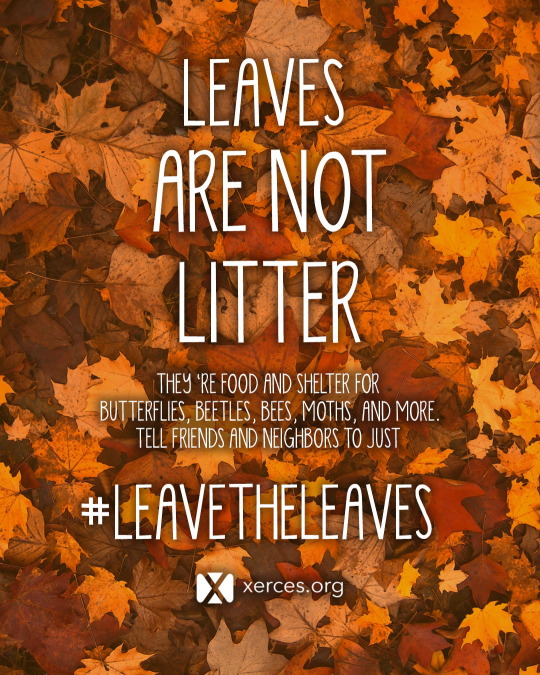
A great campaign from the Xerces Society to remind us not to clean up our yards too much in the fall!

Our little invertebrate friends need winter homes :)

Make your yard a haven for local wildlife!
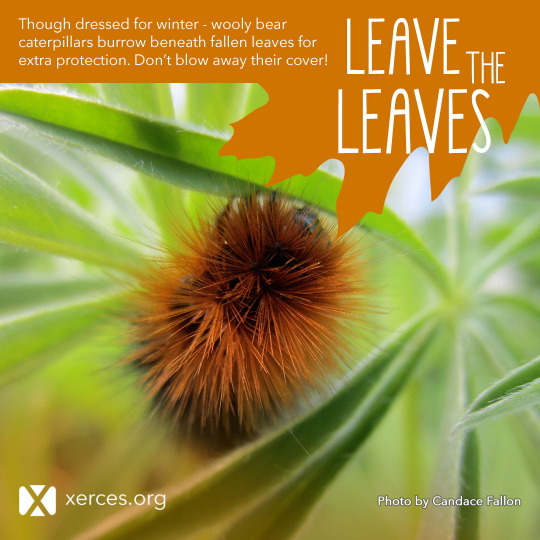
More information about how leaf litter benefits wildlife here.

Make a donation to the Xerces Society for Invertebrate Conservation here. They do great work, and I’ve been a monthly donor for a long while now.
Donate $57 and get this Leave the Leaves yard sign here!
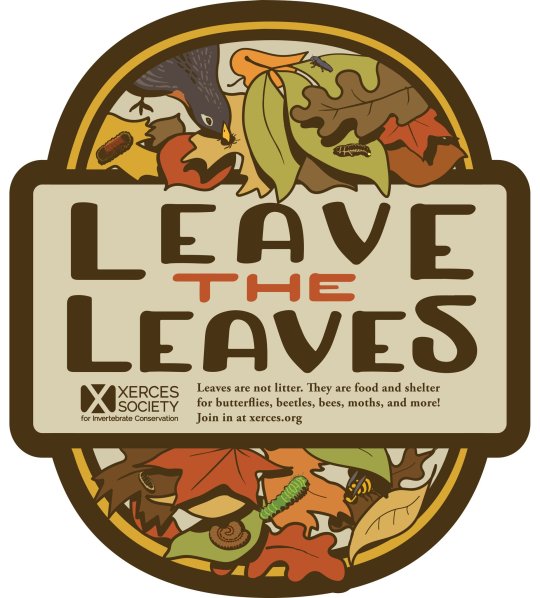
Don’t feel obligated to donate, but spreading the word on tumblr or other social media using these graphics is super helpful!
34K notes
·
View notes
Text
Maybe its a special interest or something idk but back to this post I made about making go-bags and talking to people about what they put in theirs-
Please tell me what you guys put in your go-bags that is a non-necessity for physical survival but is something for your mental well being. Mine is a travel sized sketchbook and watercolor/sketch kit the size of an average matchbox, stuffed animal (keychain sized) and comfort scarf, tell me what yours are!!! I find it very interesting someone PLS talk to me about them
#send me an ask or something or on this post#even if its a little morbid because you know it IS for disaster or worse case scenerio prep#however survival bags and whats in them makes things happen in my brain idk#and people are so interesting#sara shush
492 notes
·
View notes
Note
All of your art is so amazing, even if it's just for a con I would really be looking forward to seeing jjk art in your style! (If you do end up drawing that) You rarely post for fandoms I'm in these days but it doesn't even matter, I just love staring at your art regardless of if I know the character. Congrats on getting the con booth and I hope you're doing well!
It's the big downside of drawing for multiple fandoms, a lot of people will end up disappointed if they follow for just one. So I'm always happy to hear when people stick around for the art no matter who I draw, so thank you very much for telling me this! About jjk, there is a character that's been giving me brainrot. Before I started, I figured I would probably have Gojo as my fave. but alas:

#asks#jujutsu kaisen#sukuna#jjk#resisting urge to draw him 47835 times#---at least until i'm done with con prep#thank you anon i hope you're doing well too#you are very sweet thanks a lot for this ask!!!!#the con is small but it's my first time having sold stuff at one#after the disaster in 2020#so i'm positively excited!
140 notes
·
View notes
Text
Also, with this cold incoming, here is the CDC graphic on recognizing and treating hypothermia and frostbite. There are a lot of myths out there that can actually be very dangerous, so be sure to do your research beyond just this introductory graphic:
(click it for a better view if tumblr isn't showing it well. Or go here to see it: https://www.cdc.gov/cpr/infographics/ast-frostbite.htm )

6K notes
·
View notes
Text
As someone (from the USA) who survived a severe hurricane, if there is one piece of advice I could give, PLEASE listen to any evacuation orders. This goes for voluntary and mandatory, but ESPECIALLY mandatory. If you can't get outside the evacuation zone, even just getting closer to the boundary is better than nothing.
If you are in a mandatory evacuation zone and you stay, no one (no emergency services) will be coming to save you. You will have to hunker down for however long the storm lasts.
The time to prepare for evacuation is as soon as you know you're under evacuation order, at LEAST. Do NOT delay. You don't want to be like my family who only left once the flood began (thanks, dad). Not only did we have to hurry to pack, we weren't able to prepare. At that, here are some good things to do in a hurricane:
Have a radio - an emergency crank radio is good, since it uses mechanical energy. We also had walkie talkies.
Have a good first aid kit, especially if you cant get out.
Unplug anything that you absolutely do not need while home, unplug everything before you leave. We didn't do this and my house almost caught fire (fridge outlet) - only the flood put it out.
Have a working fire alarm, charge flashlights and devices. Make sure you also have candles and lighters, too.
Be VERY careful if you must wade or drive in flood water. There will be debris, there will be down power lines. It is deeper than it looks.
Stock up on water and nonperishable food. Eat your perishable foods now. Use coolers for any excess. MREs are good to have, you can order them online.
Put belongings you can't take with you as high up in your house as you can - prioritize things that cannot be easily/emotionally replaced. Leave space for you to go high up too, if you're staying.
Use sand bags (or DIY alternatives) as flood barriers. Tie or tarp down everything you can, and don't keep it in a wide open area.
Close windows, and stay away from them. You really don't want to be there when something comes flying.
This is all I can think of for now, others feel free to add more or correct me. Remember, your life is more important than objects. Losing your life is worse than losing everything but your life. Stay safe, and stay alive.
#ifairy#hurricane#tropical storm#natural disasters#natural disaster#hurricane preparedness#hurricane prep#hurricane season#safety#safety tips#health and safety#health#storm#storms#tropical cyclone
158 notes
·
View notes
Text
the real question is will dan and phil bring back rize for the phagenda tour
#dan and phil#phan#actually plz dont that was a disaster#just finished watching all of the old shows to prep for possible new tour
20 notes
·
View notes
Text
Let’s talk a little bit about hurricanes!
Let’s discuss where the danger lies, individual preparedness, community preparedness, and mutual aid efforts around these storms and their aftermaths.
To start, the thing to remember about hurricanes is this: It’s not one disaster. It’s hundreds of different disasters at once.
Hurricanes have their own massive winds. They also spawn tornadoes. Hurricanes bring storm surges like tsunamis, but they also bring heavy rains, swelled rivers, broken dams. The vectors for flooding are multitudinous.
With any disaster, the danger isn’t always direct. While many people die die in the immediate storm, often the deaths continue to accumulate for months after. This is because people don’t just go on living just because the storm is over. All of us have lives that are dependent on infrastructure. Medical infrastructure, food infrastructure, social infrastructure, transportation infrastructure, electrical infrastructure. When any of these fails it can put strain on the rest. People go hungry, go lonely, their disabilities go untreated, injuries are more likely in the wreckage, they die of infection and disease and suicide because it seems so hopeless. So many become homeless, displaced, losing everything. And often there is nothing in the way of aid.
And bigotry can often exacerbate. white supremacist groups and police become vigilantes, killing those who scavenge the wreckage. Even in milder hurricanes, police violence and violence from store proprietors increases. Disabled people are often pushed out of hospitals to die at home. People are euthanized.
Hurricanes exacerbate the worst parts of the system of domination.
But they also bring out the best in communities and people who believe in caring for one another.
After every hurricane, tens of thousands of volunteers go out in their airboats to save people from the floods. People prepare food, develop water filtration. People open their homes to those who have fled, those who often have lost everything. These volunteer armies of aid workers are from all accross the south east, from many paths of life and from every conceivable part of the political spectrum. On the flat boats of the Cajun Navy, in their supply lines, you will see maga hats standing next to anarchist abolitionists, both concerned primarily with how they will get an old woman both just met her medicine. Months and years after the storm you will see flocks of children flittering like bees around stripped down homes, helping to remove what is tainted and rebuild towards home again, and they will be working aside those same people who helped in the immediate aftermath.
Even when government aid does come in, it is not the government that manages all of it. They pass off many of the resources the mutual aid organizations for distribution.
The environmental cleanup, the saving, the feeding, the rebuilding; the vast majority of the work is done by everyday people. That can include you.
So, What Do We Do?
1. Individual and household preparedness.
The biggest step is preparedness. A pound of cure is nice, but it is better served with an ounce of prevention.
Individual Preparedness begins with risk evaluation.
Ask yourself these questions;
-what is the likelihood of my home flooding? Has it flooded before? How much could it flood if it did? Do I have sand bags or flood walls to prevent minor floodwaters? Do I have roof access in high floodwaters?
-what is my evacuation plan? Do I have friends in a safer area (away from coasts, outside of a flood plane)? Do I have transportation to their? If not, how can I find other people that do?
-how long can I live without power? Do I have life saving medical equipment that needs power? If so, who do I know with a generator?
-how much water do I have stored? What vessels around my house can hold water? (Remember, you can always use less than drinkable water to flush toilets).
-how much non perishable food do I have stored? How would I cook it without electricity? How much cooking fuel do I have access to? How would I continue to cook and wash dishes if I had limited access to water?
-What would keep me going if I lost everything I own? What motivations to live and keep going could I hold onto?
-do I have home insurance? Do I have pictures of the things inside my house stored on the could or a third party location incase I need to make a claim?
-where are my important documents stored? Are they safe incase of a flood, or the house falling down?
-how acclimated am I to the heat? Have I been spending enough time outside? Will a loss of air conditioning make me unable to function? Do I have a plan to get cool if that happens?
2. Community preparedness
Of course, individual preparedness is not enough, nor is it the most efficient. Survival and rebuilding comes from communities working together. So how do we do that?
Let’s talk a bit about skills you can have, and skills you can look for in your community, that might come in handy in a hurricane or post hurricane disaster.
-airboat and pirogue navigation! This is how you save lives. Flat bottom boats you can get people into.
-food storage and preservation. Networking with folks who doing canning, save beans, store large amounts of rice, gather nuts, dehydrate greens and fruits. These folks will often provide much of the food before outside aid arrives, and after it dries up.
-outdoor cooking!
-water purification. This is huge. Clean water is the hardest thing to come by. Having water purification tablets and devices, or knowing how to make your own, can save hundreds of peoples lives.
-cautious eyes. Everyone needs help spotting downed power lines in these environments.
-ham radio enthusiasts. These folks can be the lifeblood of rescue operations, resource distribution, and medical assistance. This is probably the most under utilized skill in disaster response and management
-construction. This is huge. Rebuilding requires many many volunteers. The wonderful thing tho, is you can just show up and learn most of the time.
- cleaning. Mold is a huge problem post hurricane.
-first aid!!!!
-physical strength. Many frail old people need to be carried out.
-a strong sense that flood water is dangerous. This might not seem like a skill. It is. Being willing to instill this sense of fear and respect in others will save lives.
-networking. This is huuuge. Somone has to connect all the rednecks and Cajuns and gays and aid organizations and churches and restaurants and whatever else. None of this works without relationships. Knowing people, building trust ahead of time. Being the person they come to with their resources.
-grant writing. Get that government money into the community.
3. Resource evaluation
Skills to offer your community are very important, but that’s not all we have. We have access to other resources, and if we leverage those right, those too can save lives.
Community preparedness begins with resource evaluation, and needs evaluation.
Here are some resources you might have, and how you can use them.
-a safe home, high off of flood zones. You can be an evacuation destination.
-a generator. You can be the place with power that people flee to to save their medications, or to use medical equipment, or simply to keep from having a heat stroke
-a large pot and propane burner. You can be the person who cooks for masses of displaced people. Or you can let someone else use it and cook.
-flat bottom boats. You can save people, or let others use them to.
-construction equipment and supplies. You can bring these in after a disaster to help.
-access to large buildings with generators. If you are the janitor at the stadium, you can open the gates to that high ground. If you are the secretary of the church, you can unlock the doors of shelter.
-contacts with people in nearby cities who have been through this before, and have their own resources. Hurricanes are terrible, but they don’t hit the whole south at once. We can take turns saving each other
- a pool full of water people can use to flush toilets.
- storage of food.
-space others can store any items listed
-access to lots of sunscreen, insect repellents, and mosquito nets
-access to soap, detergent, toothbrushes, toothpastes, menstrual products, and deodorant. Specifically go for free and clear soaps, dial gold, and dawn. They all have different applications.
-an excess of phone chargers. Phones are lifelines. They are one of the most important things you can have.
-an excess of medicines. Rationing and saving prescriptions might save your life or others.
-first aid equipment
4. need’s assessment.
All of this is great, but to make best use of it, it’s best to know ahead of time where resources will be needed, and who might need the most help.
Begin learning this by focusing on these things.
-do you know the people who live around you? Do you know who’s old and alone, and might need to be checked on in a storm? Do you know who is disabled? Do you know who lives at the bottom of your hill by the flooding creek, and who lives at the top where it’s safest? These questions can save lives!
-do you know who might need help evacuating? If you plan to evacuate, do they know you could take them with you?
-do you know who needs access to generators for life saving equipment?
-do you know who is too poor to afford to be prepared?
-do you know who might need help putting sand bags around their home?
-do you know which mutual aid and charity organizations might need help connecting to local communities?
Thank you for reading!
Stay safe out there, and help as often as you can, while still keeping yourself stable enough to help again later. Right now many homes are flooded in Florida, power is out in Georgia, and a dam broke near Asheville.
Volunteer : https://stability.org/default.aspx
Donate : https://nonprofit.resilia.com/donate/
https://nonprofit.resilia.com/donate/
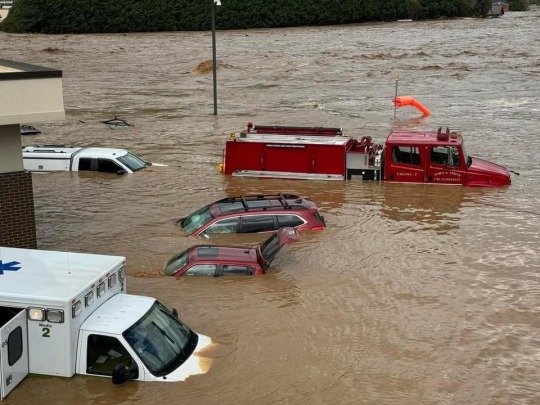
#hurricane#hurricane helene#mutual aid#preparedness#prepping#preppers#anarchism#disability#natural disasters#rose baker#text post#links#community#floods#tornado
14 notes
·
View notes
Text
A Heathen Prepping -Bug Out Bags
For the most part the A Heathen Prepping posts have focused on at-home preps. Bug Out Bags, or BOBs, are for when that is not the best option or when you are away from home. There are a lot of SHTF (Shit Hits The Fan aka emergency, disaster, or catastrophic) scenarios that can make your home dangerous to hunker down in. Fires, floods, earthquakes, and civil unrest come to mind. BOBs ask us two…
#ancestors#animism#animist#bindrune#bindrunes#BOB#Bug Out Bag#catastrophe#City Prepping#disaster#emergency#Gods#magic#physical#polytheism#polytheist#prep#preparation#preparedness#Prepping#religion#spiritual#spiritwork#vaettir#vættirverk#vættirverkr#verk#verkr
10 notes
·
View notes
Text
Hi to any Americans out there what actually is a prep rally?
(Also are prom posals rlly that big of a thing? Or is that a movie over exaggeration?)
#disaster's posts#i was reqatchung the prom pact#and this thought just hit me#like are prep rallies actually this huge or do movies exagerate?#same for promposals#prom pact
9 notes
·
View notes
Text

🌍 The World is Changing: Are You Ready? 🌍
Right now, we are living in unprecedented times. Political tensions are rising, racial divisions are deepening, the migrant crisis is overwhelming our cities, and violence seems to be at every corner. Inflation is making it harder to get by, the Israel/Palestine conflict continues to escalate, and homelessness is becoming a growing crisis. As Black people, we have always been resilient, but now is the time to prepare and protect what matters most—our families.
Don’t Wait Until It’s Too Late!
The Urban Survival Playbook is the single most important digital product you can purchase right now to navigate these uncertain times. This isn’t just another guide; it’s a blueprint for survival, crafted with our community in mind. Whether it’s mass shootings, economic collapse, or civil unrest, being prepared can mean the difference between chaos and control.
🛡️ Why You Need This NOW:
• Stay ahead of the curve—learn how to protect your family before disaster strikes.
• Get practical, no-nonsense strategies to keep your home safe.
• Plan for emergencies like food shortages, natural disasters, and power outages.
• Build mental resilience to handle the stress of an unpredictable world.
💡 Take Action Today!
Don’t wait until a crisis catches you off guard. Your family’s safety depends on your preparedness. Visit our website and get the Urban Survival Playbook now. It’s time to start planning for the unexpected. Waiting could cost you dearly, but being ready will give you peace of mind.
#melanin#family preparedness#survival guide#crisis prepping#black preppers#stay ready#self reliance#disaster ready#emergency preparedness
11 notes
·
View notes
Text
Did u know your periods aren't supposed to cause you debilitating pain? Did you know you're not supposed to be anemic to the point of passing out? That you're not supposed to be passing clots as big or bigger than a half-dollar??
Did you know that your cycle should be /predictable/ and consistent by your early 20s? Should be happening every 3-5 weeks?
That if your cycle is unpredictable or random or even lasting more than a week (like heavy for more than 3-5 days) you should ABSOLUTELY get checked out for that?
That if you have such intense pms that you wanna kys every month that it is NOT normal either? (I dealt with this one, not fun.)
Hormonal and reproductive health is important and more people who have periods /should/ be taught these things.
Endometriosis and PCOS are only two things that could be fucking with you. Both can send you to the emergency room! I personally know someone who's been sent to the ER for both conditions near killing her!
Please talk if you have abnormal or painful period problems!!
#dantes vibe corner#my three special interests are#extreme weather/disaster prep#nutritional and food safety#and reproductive health
62 notes
·
View notes
Text
Maybe it’s just my feed but the only place I’m seeing anything about h5n1 is twitter. PAY ATTENTION TO IT!!! Prepare NOW! not when everyone starts to hear about it, not when everyone starts to care, not when the CDC finally admits it’s an issue (if they ever do). Prepare right now. While you have the chance. I am talking to everyone in my life about masks and precautions. I was hesitant about it before bc fear of confrontation but I’m cracking down now. I am going to stock up on essentials. My list right now is non-perishable foods, masks, bottled water, first aid kits, basic medications, and other essentials I can think of. I am going to be incredibly diligent about hygiene and selective about where I go in public. This is not me trying to fear monger. I would rather be paranoid and alive than dismissive and dead. This has high potential to be so so so serious. Please treat it as such.
#h5n1#bird flu#avian flu#disaster preparedness#quarantine prep#preparation#pandemic#public health#health#safety#social justice#disabled liberation#disability justice#cdc
15 notes
·
View notes